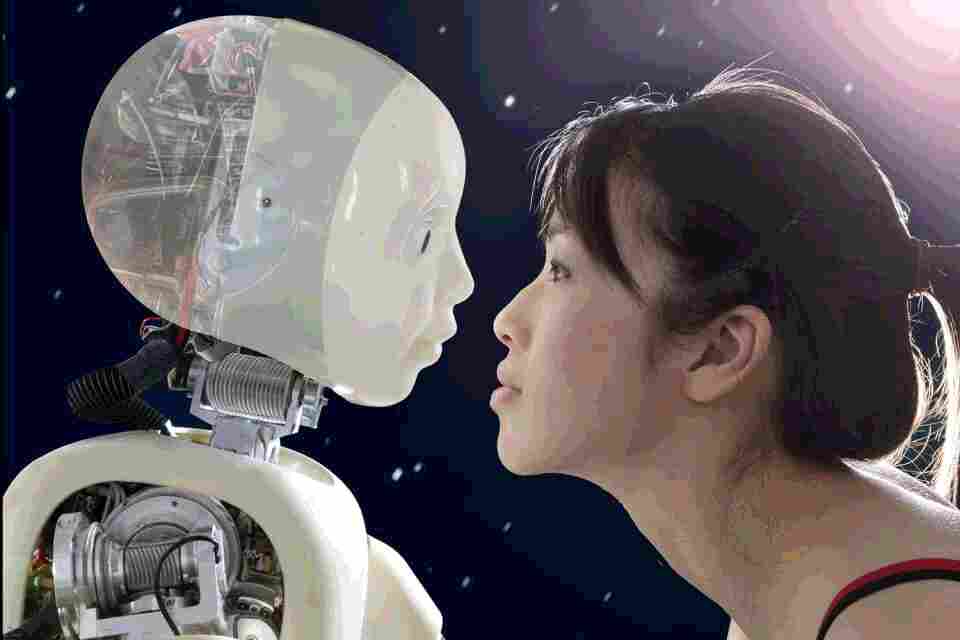Technology
Humans and robots are getting closer than ever through romance and relationships

AS ROBOTS and humans grow increasingly closer, we’re starting to form all kinds of relationships with machines.
Are you and your phone platonic or are you turning into a machine yourself?
Robots have the capacity to change everything we know about being human
Nearly 84% of the global population is in possession of a smartphone and they’re becoming something we can’t live without.
“We’re already a cyborg,” Elon Musk told Kara Swisher. “You have a digital version of yourself, a partial version of yourself online in the form of your emails, your social media, and all the things that you do.”
Musk’s statement tracks with what roboticists have found in studies about human-robot connections.
Read More in Robots
Robots as an extension of humanity
Robots are everywhere – in just one morning, a person might use a coffee maker, electric toothbrush and iPhone before leaving the house.
Depending on their function, appearance and experience with the robot, people value robots with varying intensity.
In a study of military personnel and advanced robots, Dr Julie Carpenter found soldiers “frequently described the robot as ‘my hands’ or otherwise as a physical extension of themselves.”
Most read in Tech
Robots become more than tools to the soldiers they “serve” with – bots are given characteristic names, and the ones that are destroyed in combat are given a soldier’s burials, complete with 21-gun salutes and eulogies.
This concept of projecting human attributes onto an object is called anthropomorphization – and its visible with robots and humans that have been through fewer traumas together than military robots and human soldiers.
In an episode of the Lex Fridman Podcast, roboticist Kate Darling noted that people form a meaningful relationship with the popular robot vacuum cleaner, the Roomba.
People will talk to their Roomba, express empathy for their Roomba when it gets stuck in corners or even come to notice their Roomba has a personality.
In contrast, children were found to be so widely disrespectful to Alexa that Amazon had to add a “Magic Word” feature to try to deter the negative comments.
“We treat them as though they’re alive even though we know perfectly well they’re machines,” Darling said, speaking on helpful robots at the 2017 Aspen Ideas Festival.
We can see positive and negative treatment of robots that don’t make an attempt to look human in the Roomba and the Alexa.
Will humans abuse or respect robots as they look more lifelike?
Humans and humanoid robots
Ameca, one of the most lifelike robots to date, can smile, blink and move its shoulders in a highly realistic way.
Engineered Arts, Ameca’s “parents” said the robot “is the world’s most advanced human shaped robot representing the forefront of human-robotics technology.”
Ameca is a blank slate – while the robot does possess some AI capabilities, Engineered Arts designed the bot to be a vessel for other AI programs to be tested and developed.
AI developers are creating programs that suit a humanoid robot – Sanjit Singh wrote for Forbes that humanoid robots will be able to undertake “different human tasks and occupy different roles in the employment sector.”
One of the tasks that humanoid robots are frequently latched to in media is sex or sex work.
David Levy, a doctor of social robotics, thinks AI robots will fully integrate into human’s social and sex lives.
“I think the first sophisticated sex robots will be around by 2050, but it will be another 50 years before they’re commonplace and people accept its normal for a friend to say, ‘I am in love with a robot and I am thinking of marrying it’” he said.
Sex robots could be a foil for the sex work industry – though some argue sex robots would further solidify a problematic mindset for some men.
“Increasingly realistic sex robots run the risk of hardening such men’s attitudes toward human women,” a sex worker told Bitch Media. “They already see women as subhuman, and now we’ll have actual subhumans programmed to mimic us as much as possible.”
The two perspectives – robot spouses and robot sex workers inadvertently undermining actual women – are not mutually exclusive.
We are hurtling towards a world where both realities are possible, a situation comparable to the endeared Roomba and verbally abused Alexa.
While sex robots may be a noticeable topic for the media, robots modeled after humans may not be entirely doomed to a prickly existence somewhere between partner and sex doll.
Elon Musk’s electric car company Tesla is developing Optimus the Tesla Bot – once available, it will walk on two legs and has a head atop its torso, but it is expressly not human in its appearance with a screen for a face.
Musk said Optimus will be engineered to do the “repetitive and boring work” that humans do not want to do.
Automation is a threat to some human workers, and he did not get into specific careers for Optimus, but Musk’s spoken aim is to automate jobs humans will happily give up as opposed to fields where workers are reluctant to pass their job to a robot.
These ethical questions about human-robot interactions will present themselves sooner than we imagine.
Read More On The Sun
And, whether you’re friendly to robots or not, some experts think humans will be marrying them as soon as 2045 – just over 20 years from now.
Right now, robots can chat, move and lift – it won’t be long before they can think, reason and feel.
The Tesla Bot stands at 5’8″ and weighs 125 poundsAFP – Getty
Ameca’s facial expressions are shockingly lifelikeGetty Images – Getty
We pay for your stories!
Do you have a story for The US Sun team?
Email us at exclusive@the-sun.com or call 212 416 4552.
Like us on Facebook at www.facebook.com/TheSunUS and follow us from our main Twitter account at @TheSunUS

